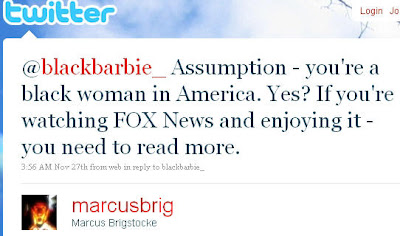In the latest issue of Standpoint, Nick Cohen argues that the recent Twitter campaign against the Daily Mail’s Jan Moir was less about “‘reader power’ in action” and more to do with like-minded people “affirming their membership of the liberal tribe…”
The use of Twitter to affirm one’s trendy, right-on credentials is especially noticeable among the UK’s tweeting celebs and media luvvies. The most followed of the lot is the BBC’s Richard Bacon who, as one of the chieftains of Twitter’s “liberal tribe”, cheered on the hunt for Moir.
He was asked about Twitter by Matthew Wells on this week’s Guardian Media Talk podcast (16 min in):
Wells: How do you feel, Richard, about your personal power to influence people by what you say on Twitter?
Bacon: It’s an issue for me because I work for the BBC, and I work for Five Live and I do programmes that are news based. And it’s difficult, and I think there’s a grey area at the moment. I’ll often re-tweet – you know what re-tweeting is? You can put up a link to an article that I like, and on occasion I’ll be re-tweeting to an article that may well express an opinion that I’m sympathetic towards. That’s not the same as me expressing an opinion, but you could argue that it is. Now that…to me this is a grey area that I imagine one day they’ll legislate.
Channel 4’s Benjamin Cohen: We’re having a policy launched very soon at ITN to say what we can and can’t say.
Bacon: There’ll be some committee…
Guardian’s Emily Bell: Are you going to have non-tweets, things that you cannot tweet?
B.Cohen: We’re going to have subjects that you shouldn’t tweet about.
Bacon: Are you?
B.Cohen: We’re trying to keep the broadcasting [unheard] in what we tweet, so – don’t express an opinion.
[Crosstalk]
Bacon: What about that grey area that I mentioned? Re-tweeting a link to an article, often I’m just saying here’s an interesting article, but occasionally – and I guess I did do this with Jan Moir – you’re going look at, you know, here’s what Charlie Brooker says about Jan Moir and really I agree with that. And so it’s a grey area and probably someone from the BBC Trust will be listening to this podcast and the rules will all change and I’ll regret saying these words.
Bacon has just signed a three-year deal to present the afternoon slot on Five Live, during which time he’ll be covering, among other things, the next US midterm and presidential elections. His views of one potentially influential player in those elections can be gleaned from some of his tweets [click image to view]:

[For those who don’t know, Andrew Sullivan hates Palin with a deranged passion (he’s the “liberal blogger at The Atlantic” mentioned in this Jonah Goldberg article), and Levi Johnston is now a performing monkey for the Palin-hating media in America.]
And here’s Bacon on Obama:

I suspect that the BBC will indeed follow ITN’s example and issue Twitter rules for its employees, but I’d rather they just let them say what they want. The insight it offers is most instructive.





